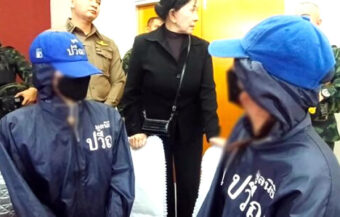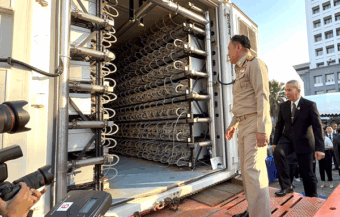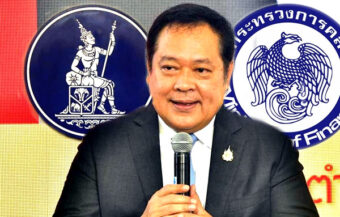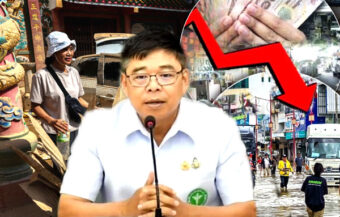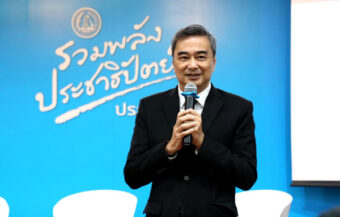The World Bank warns that chronic levels of household debt and a failure to contain a flare-up from Omicron could see Thailand’s economy go backwards in 2022 by 0.3% with only a 1% growth rate this year. On the other hand, it suggests that the kingdom’s external financial position may help cushion it from the impact of rising inflation and higher rate pressures emerging from the United States economy.
Calls were made to the government this week to prepare for the possibility of an elevated inflation rate for the kingdom in 2022 as well as the prospect of higher interest rates being forced on the Bank of Thailand as the US Federal Reserve is thought to be ready to take action to tamp down historically high levels of inflation recorded stateside in November. Last week, the World Bank in its economic assessment for Thailand going into 2022, suggested the kingdom was better placed to ward off the worst of anticipated inflationary pressures. However, the Trade Policy and Strategy Office has confirmed that it does see the rate rising to possibly 3% in the course of the next 12 months.

The economic working group of Thailand’s main opposition Pheu Thai Party has warned of the potential knock-on effects on the kingdom’s struggling economy of rising inflation in the United States which is expected to force the US Federal Reserve into tightening credit in the world’s largest economy with an accelerated tapering off of bond purchases and a series of interest rate hikes.
The Federal Reserve led by Jerome Powell is now expected by most analysts to raise interest rates by a minimum of 1.5% from next year into 2023.
Pheu Thai raises the threat of higher inflation and raised interest rates to an already struggling economy
On Thursday, Pheu Thai MP for Loei, Lertsak Pattanachaikul warned that the inflationary pressures in the US may translate into the Thai economy with the country’s economic policy team currently targeting a medium-term rate of 1 to 3% in 2022.
According to Ronnarong Phoolpipat of the Trade Policy and Strategy Office at the Ministry of Commerce, however, the headline inflation rate in Thailand is likely to rise by up to 3% in 2022 from a range of 0.8% to 1.2% in 2021.
He predicted that the development may see the government reverting to subsidies for the less well off to help with electricity and water costs next year as the economy fights to regain momentum.
‘From such cost-push factors, Thailand’s headline inflation in 2022 may possibly hit 3%, a rate last seen in 2012,’ Mr Ronnarong said. ‘Rising headline inflation may negatively affect salaried employees and farmers whose income does not come in line with rapidly rising expenses.’
Cabinet sets a range of 1% to 3% as a medium-term inflation target range as US inflation figures for November skyrocket and world outlook darkens
On Tuesday, Thailand’s cabinet set a range of 1% to 3% for the Bank of Thailand which has a key role in maintaining economic stability and guarding against runaway inflation.
The rise of inflation in America has set alarm bells ringing across the world with a survey in November showing that 59% of small business owners had raised their prices, the largest number recorded since 1978.
The inflation rate for consumer prices in November came in at a startling pace of 6.8% with an even more disturbing trend in wholesale inflation which was recorded at 26.5%, the highest figure recorded since 1974 or 47 years ago.
Thai economy cannot handle raised inflation and higher bank interest rates says Pheu Thai executive
On Thursday, Mr Lertsak, an Executive Director of the Pheu Thai Economic Working Group warned that Thailand’s already beleaguered economy was not in a position to deal with both rising interest rates and a sudden spike in inflation at this time.
However, the World Bank last week predicted a 1% growth rate for this year and an upside of 3.9% in 2022 on the assumption that the current reopening to foreign tourism is maintained despite the threat from the Omicron variant of the virus.
It suggested that Thailand’s relatively strong external financial position left it better placed to weather the adjustments that must be made by the Federal Reserve to tackle inflationary pressures.
World Bank economist says Thailand’s external financial position may help but its chronic level of household debt is a significant vulnerability
However, Kiattipong Ariyaprachya, a senior economist at the World Bank with a long experience in monitoring the Thai economy also warned that a more damaging virus flare up from Omicron and other internal weaknesses in the kingdom’s economy such as its record high level of household debt could lead to a more negative outcome for the country which could conceivably see negative growth or a further contraction of 0.3% in 2022.
Thailand saw its level of household debt rise to 90.5% in the first three months of 2021, an unsustainable level and one which requires action by the central bank.
The situation deteriorated further in the summer. It was reported that a survey in September revealed that 70% of Thai households lost 40% of their income at the height of this year’s economic crisis sparked by the pandemic.
Crisis greater than the Financial Crisis of 1997 with household and private sector debt at worrying levels
70% of Thai households have lost 40% of their income revealed a tourism survey this week
Omicron has arrived in Thailand but top officials believe they can manage an escalating situation
Loei MP Mr Lertsak also referred to the sky-high level of household debt in Thailand which has, in recent years, been highlighted as a key impediment to economic growth by the Bank of Thailand.
Mr Lertsak expressed a fear that rising interest rates in the US may see Thailand’s central bank forced into raising rates also in the kingdom from their current historic low of 0.5%.
Capital flight from Asia as the broader global economy may face a tough year ahead with slowing growth
At a broader level, interest rates in the United States and other factors such as growing unease about the Chinese economy may see capital flight out of Asia and a weakening baht.
Mr Lertsak urged Prime Minister Prayut Chan ocha and his economic team to explore such possibilities and prepare an economic contingency plan accordingly.
The wider problems for the world economy has been highlighted this week by an International Monetary Fund (IMF) team of economists which revealed that global debt at this time within the world’s financial system stood at $226 trillion.
The economists pointed to the highest level of state or government intervention in the world’s economy in the course of the pandemic, the most significant since World War Two which has seen government borrowing levels worldwide explode.
It has warned that governments and economic agencies must now act carefully and nimbly to head off inflationary pressures while also trying to protect economies from the impact of higher borrowing costs which will hit both the public and private sectors at the same time, thwarting the prospects of economic recovery and GDP growth worldwide.
Higher interest rates will have effects both on the public and private sectors with unprecedented levels of world debt built up by the pandemic crisis
Vitor Gaspar is the head of the International Monetary Fund (IMF)’s fiscal affairs department in Washington DC.
He warns that while government and banking institutions are right in acting to ward off inflation, the growing levels of debt tend to amplify ‘vulnerabilities, especially as financing conditions tighten. High debt levels constrain, in most cases, the ability of governments to support the recovery and the capacity of the private sector to invest in the medium term.’
Thailand’s economic outlook appears to be more benign for now with further fiscal stimulus planned
However, the situation in Thailand, for now, appears more benign with Minister of Finance Arkhom Termpittayapaisith signalling that in the weeks leading up to the new year, the government will announce further fiscal stimulus measures to support the economy as the kingdom’s foreign tourism reopening progresses.
A cautious recovery in 2022 says Bank of Thailand boss but PM strikes a mildly more optimistic note
Mr Arkhom characterised the package to be announced as a New Year’s gift to the Thai public and is thought to include somewhere between ฿30,000 and ฿50,000 per person in tax deductions for purchases in the New Year.
Good news on progress towards digital utilisation by the kingdom’s population highlighted by World Bank country manager Birgit Hansl this week
Also, on a more positive note, Birgit Hansl, the country manager with the World Bank for Thailand, has highlighted that the kingdom’s population has made impressive strides in adapting to digital operations and activity online with a 30% rise in the use of digital processing systems by the populace since the pandemic crisis began in March 2020 leaving the country only behind Singapore in Southeast Asia in this capacity.
The financial institution has recommended that Thailand invests further in retraining its workforce and population to work online and provide enhanced support to this growth sector.
Join the Thai News forum, follow Thai Examiner on Facebook here
Receive all our stories as they come out on Telegram here
Follow Thai Examiner here
Further reading:
A cautious recovery in 2022 says Bank of Thailand boss but PM strikes a mildy more optimistic note
With Omicron hovering, firms already suffering a cash flow crunch with the economy again in peril
Shaky economic recovery as planners target only a 1% gain in 2021 with rising headwinds in Quarter 4
Economy climbing out ‘of a hole’, foreign firm’s confidence levels rose sharply during October
Another GDP contraction looms as Thailand tries to boost its economic fortunes by spending more
Government borrows more to bring the economy through an extended Covid 19 crisis with GDP flat
Officials switch to prioritising economic recovery as CCSA expected to agree a new Covid approach
Rising prospect of GDP contraction for 2021 may see government breach the legal public debt limit
Economic fears rising as Thailand faces a bigger crisis than 1997 with rising job losses and debt
Baht falling with confidence in Thailand waning as foreign tourism closure and virus drive funds out
Central bank to lower GDP growth forecast as its attention turns to private sector debt management
Loan bill passes but Thai economic prospects are not bright with a 1.8% 2021 GDP gain predicted
IMF urges government to loosen nation’s purse strings as finances tighten with the tax take down
Failure to pass the ฿500 billion borrowing decree could lead to the dissolution of parliament
Industry leaders and central bank all warn that foreign tourism must return to avoid a collapse
Fact – only 6,556 visitors arrived in Thailand last month compared to 3.95 million in December 2019
Desperate foreign tourism business concerns are clinging to straws as they try to survive the crisis
Challenge of the virus and closure to tourism leads to major long term changes in the Thai economy
Finance Minister says economy must pivot away from tourism with a switch to S-Curve industries
Strengthening baht predicted as investors bet on a reopening of Thailand to mass tourism in 2021
Thailand facing a credit crunch as 3rd virus wave craters the kingdom’s economic recovery plans
3rd virus wave now spells not just economic loss but financial danger as kingdom’s debt level rises
Still time to avoid lockdown says Health Minister as 3rd virus wave dwarfs all infections to date
Thai economy is still in reverse despite rising confidence and a virus threatening a 3rd wave
Reopening of Phuket still not officially approved although it is the ideal test for a broader move
Minister urged not to be afraid to borrow in 2021 as fears grow for a quick foreign tourism revival
Economy to rebound as the year progresses driven by exports and a return of mass foreign tourism
Door closing on quick foreign tourism return as economic recovery is delayed to the end of 2022
Fact – only 6,556 visitors arrived in Thailand last month compared to 3.95 million in December 2019
Desperate foreign tourism business concerns are clinging to straws as they try to survive the crisis
Finance Minister says economy must pivot away from tourism with a switch to S-Curve industries

